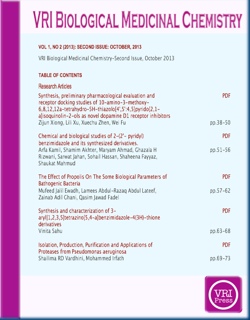
The Effect of Propolis On The Some Biological Parameters of Bathogenic Bacteria
Abstract
The ability of propolis to inhibit growth of different types of pathogenic bacteria was investigated. Different concentration were prepared from Ethanolic Extract of Propolis using 5%, 10%, 15%, 20% and 25%. The diameter of inhibition zone increase with increase of concentration of propolis. The propolis was more effective against Gram-positive bacteria (S. aureus and Streptococcus mutans) than the Gram-negative bacteria (E. coli, P. aeruginosa and Proteus mirabilis).The Redox status of such bacteria broth has been evaluate and results shows that oxido index reduce in its value which reflect the tendency of bacteria to overcome such effect.Â
Keywords
Full Text:
PDFReferences
Narbona E, GarcÃaâ€GarcÃa E, Vázquezâ€Araújo L, Carbonellâ€Barrachina ÃA: Volatile composition of functional 'a la Piedra'turrón with propolis. International Journal of Food Science & Technology 2010, 45:569-577.
Falcão SI, Vilas-Boas M, Estevinho LM, Barros C, Domingues MRM, Cardoso SM: Phenolic characterization of Northeast Portuguese propolis: usual and unusual compounds. Analytical and bioanalytical chemistry 2010, 396:887-897.
Silici S, Kutluca S: Chemical composition and antibacterial activity of propolis collected by three different races of honeybees in the same region. Journal of Ethnopharmacology 2005, 99:69-73.
Sforcin JM, Bankova V: Propolis: is there a potential for the development of new drugs? Journal of Ethnopharmacology 2011, 133:253-260.
Park YK, Alencar SM, Aguiar CL: Botanical origin and chemical composition of Brazilian propolis. Journal of Agricultural and Food Chemistry 2002, 50:2502-2506.
Bnyan I, Ewadh M, Fadel Q: Oxido-Sensitive Index Between Superoxide Dismutase And Xanthine Oxidase In Pathogenic Bacteria. International Journal of Biotechnology and Biochemistry 2013, 9:163-166.
Darwish RM, Fares RJA, Zarga MHA, Nazer IK: Antibacterial effect of Jordanian propolis and isolated flavonoids against human pathogenic bacteria. African Journal of Biotechnology 2011, 9:5966-5974.
Forbes B, Sahm D, Weissfeld A: Bailey and Scotts' Diagnostic microbiology edn 12th. Germany: Elsevier; 2007.
Ackerann B, A.S., : Xanthin oxidase activity in method of Enzymatic Analysis. edn 2nd. Edited by Berganeyer: Academic 1974:521.
Marklund S, Marklund G: Involvement of the Superoxide Anion Radical in the Autoxidation of Pyrogallol and a Convenient Assay for Superoxide Dismutase. European Journal of Biochemistry 1974, 47:469-474.
Kim Y-H, Chung H-J: The effects of Korean propolis against foodborne pathogens and transmission electron microscopic examination. New Biotechnology 2011, 28:713-718.
Silva JC, Rodrigues S, Feás X, Estevinho LM: Antimicrobial activity, phenolic profile and role in the inflammation of propolis. Food and Chemical Toxicology 2012, 50:1790-1795.
Inouye M: Bacterial Outer Membranes as Model Systems. New York: Wiley; 1986.
Taylor RSL, Manandhar NP, Hudson JB, Towers GHN: Antiviral activities of Nepalese medicinal plants. Journal of ethnopharmacology 1996, 52:157-163.
Hernández-Pérez M, López-GarcÃa RE, Rabanal RM, Darias V, Arias A: Antimicrobial activity of< i> Visnea mocanera leaf extracts. Journal of ethnopharmacology 1994, 41:115-119.
Hendi NKK, Naher HS, Al-Charrakh AH: In vitro antibacterial and antifungal activity of Iraqi propolis. Journal of medicinal plants research 2011, 5:5058-5066.
Gonsales GZ, Orsi RO, Fernandes Júnior A, Rodrigues P, Funari SRC: Antibacterial activity of propolis collected in different regions of Brazil. Journal of Venomous Animals and Toxins Including Tropical Diseases 2006, 12:276-284.
Kilic A, Baysallar M, Besirbellioglu B, Salih B, Sorkun K, Tanyuksel M: In vitro antimicrobial activity of propolis against methicillin-resistant Staphylococcus aureus and vancomycin-resistant Enterococcus faecium. Ann. Microbiol 2005, 55:113-117.
Ophori EA, Eriagbonye BN, Ugbodaga P: Antimicrobial activity of propolis against Streptococcus mutans. African Journal of Biotechnology 2010, 9:4966-4969.
Glinski Z, Meresta T: Trials to standardize an antibacterial activity of propolis. Medycyna Weterynaryjna 1993, 49:27-27.
Bosio K, Avanzini C, D'Avolio A, Ozino O, Savoia D: In vitro activity of propolis against Streptococcus pyogenes. Letters in applied microbiology 2000, 31:174-177.
Takaisi-Kikuni NB, Schilcher H: Electron microscopic and microcalorimetric investigations of the possible mechanism of the antibacterial action of a defined propolis provenance. Planta Medica 1994, 60:222-227.
Kurpisz M, Miesel R, Sanocka D, Jedrzejczak P: Seminal plasma can be a predictive factor for male infertility. Human Reproduction 1996, 11:1223-1226.
DOI: http://dx.doi.org/10.14259%2Fbmc.v1i2.65
Refbacks
- There are currently no refbacks.








